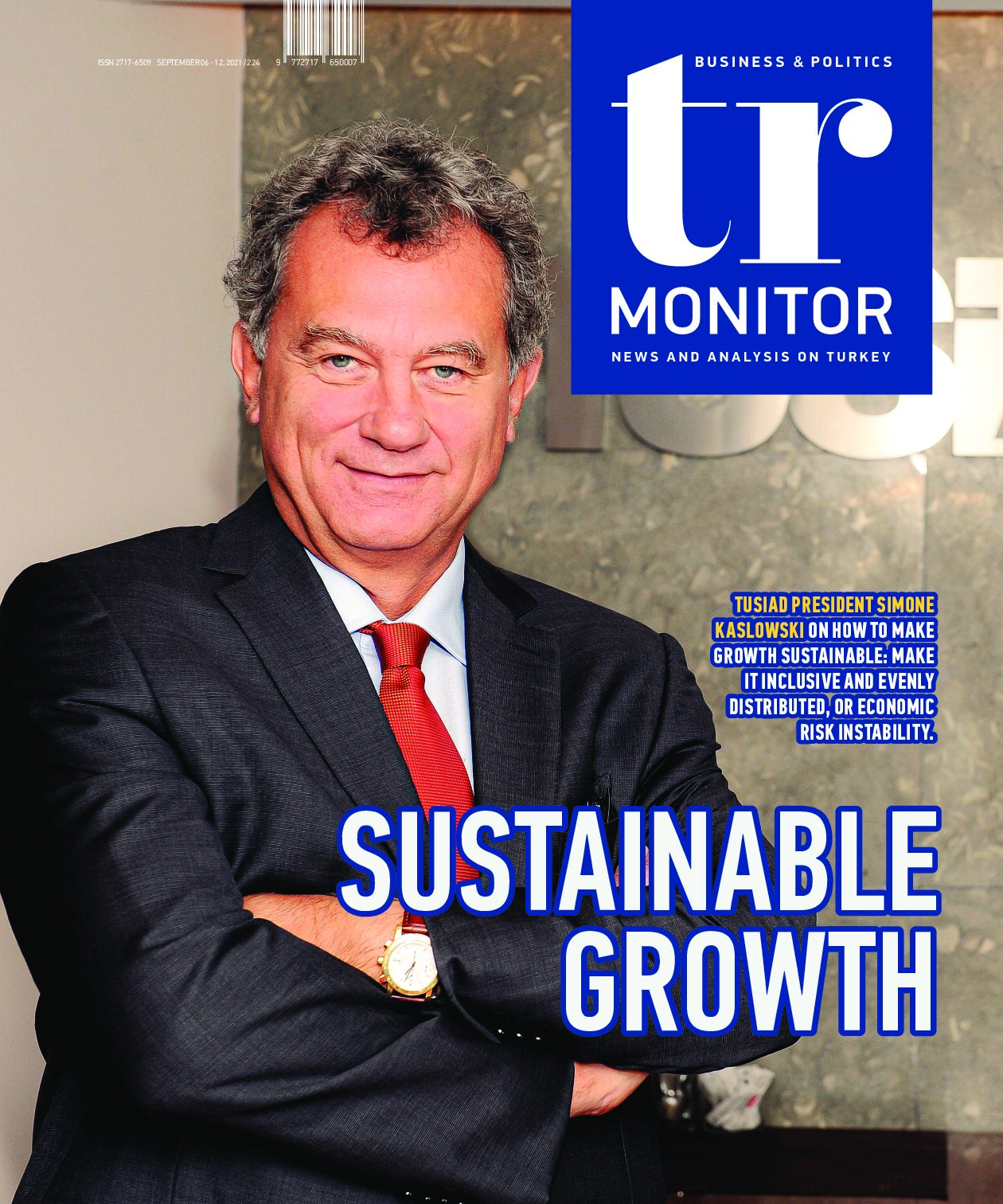By HAKAN GULDAG and HANDAN SEMA CEYLAN
The Turkish economy expanded by 21.7% year-on-year in the second quarter of 2021, marking the highest annual growth rate since 1999. The country’s gross domestic product (GDP) at current prices increased by 52.4% to USD 188.6bn in the April-June period, according to the Turkish Statistical Institute. The U.S.-based multinational banking and financial services company JP Morgan revised Turkey’s 2021 growth forecast from 6.8% to 8.4% following the official announcement.
Economists have already started to analyze the reasons behind such exceptional growth, much of it of course due to the base effect. What do business people think? Representing 50% of the country’s value added, 85% of total foreign trade, more than 50% of employment and 80% of corporate tax revenues, the Turkish Industry and Business Association (TUSIAD) has a front row seat to Turkey’s economic rollercoaster ride. For stability, says its President Simone Kaslowski, attention needs to be paid to steady and permanent growth rather than high short-term rates. “Without this, investments and production fluctuate, income is unevenly distributed, and you cannot create permanent employment. When this situation is combined with inflation, people cannot feel growth in his own wallet. Growth needs to be inclusive,” Kaslowski says.
In an exclusive interview with Hakan Guldag, chairman of Nasil Bir Ekonomi, publisher of daily DUNYA, and its Managing Editor, Handan Sema Ceylan, Kaslwoski discussed Turkey’s economy from a variety of perspectives and offered a path to a more sustainable future.
What then, should Turkey pay attention to in order for growth to be felt on the streets? Turkey’s high growth figures are in line with strong growth all over the world in 2021, according to Kaslowski. But two factors need attention, he says. “First of all, our exports are very strong because the manufacturing industry in Europe, our most important trade partner, is at its highest level in the last 20 years. Secondly, cheap loans provided in 2020 contributed significantly to this year’s investments.” Neither of these developments translate into benefits for ordinary citizens, he adds, because although the economy was supported thanks to the cheap funding provided last year, the country was left with very high inflation as a side effect.
“This resulted in a very rapid loss in purchasing power. For this reason, we draw attention to the importance of permanent growth, not short-term high growth. Without these, investments and production fluctuate, income is unevenly distributed, and you cannot create permanent employment. When this situation is combined with inflation, the citizen cannot feel growth in his own pocket. Growth needs to be inclusive. Otherwise, although we may see periodic growth, it is not very likely to be reflected on the streets.”
Critical months ahead for Turkey
The world economy has gone through an unprecedented and difficult period where there was a massive monetary expansion. As we approach the third quarter of the year, the U.S. Federal Reserve (Fed) is entering a new normalization period in which it is begining to reduce its asset purchases. All scenarios are made within the framework of putting the brakes on monetary expansion as we enter 2022. The only way for Turkey to prepare for this period of intense volatility in the short term is to implement the right monetary and fiscal policy, according to Kaslowski.
“Our inflation is very high and our external fragility is crystal clear. The steps to be taken in monetary policy must be extremely well-timed in this new period. Some developing countries, which are our peers, have started to raise interest rates ahead of time to prepare for this process,” he notes. As inflation expectations are rising in Turkey, he thinks the country has entered a critical 4-5 month period in which it must act patiently, not hastily, in terms of the interest rate cuts on its agenda. “We are in a process where we need financial stability,” he says.
Global monetary policy is changing and we are entering this volatile period with a very high inflation rate of 19%. This makes the country’s economy more vulnerable to external shocks. “We should get out of the spiraling inflation-currency-interest debates and not miss the rapidly changing global theme. Just as we have been patient in monetary policy in the past months, we should not cut interest rates before inflation falls permanently,” he cautions.
“Turkey’s current inflation dynamics are even worse compared to the past 4-5 years. If we want permanent interest rate reduction, we must first reduce inflation structurally. Without this, every step we take will generate much higher interest rates, higher exchange rates and increased welfare loss after a period of time.”
Turkey should also take into account that the wind will not blow behind in the changing global monetary policy, and act with a long-term perspective. “First of all, we need to lower the country’s risk premium. Financial stability and predictability are also needed to reduce the risk premium.”
‘Wildfires are alarm bells’
We also asked Kaslowski to evaluate the policies Turkey pursued to tackle the COVID-19 pandemic, climate change and migration, the three main issues that are currently on the agenda globally. He also thinks that these three problems are among the biggest threats to the world. “Climate change affects us disproportionately,” he says. “Our country is rapidly becoming a desert; we are losing our forests and seas. Recent forest fires and floods are alarm bells for our country. We must quickly take strong steps to protect our forest assets and water resources.”
Turkey is at an important stage in the pandemic process, Kaslowski adds. “We need to make rapid progress in vaccinations and be able to enter into permanent normalization processes, especially in face-to-face education, he says. As for migration, which is subject to complex internal and external forces, we ofer Kaslowski’s insights in separate box.
The pandemic, however, has also revealed some opportunities as supply chains evolve and trade wars continue to cause tensions between the U.S., Europe and China. Where should Turkey position itself?
There are big bottlenecks in logistics and production such as situations where the demand is not met even for the most basic needs, Kaslowski agrees. However, he points to a more future looking side of the problem vis a vis EU businesses, which impose obligations on supply chains to comply with issues such as climate, environment, human rights and employee rights. Green and digital investments, the rule of law and sustainability in the economy are becoming the main decision-making criteria in funding and investment decisions by both the EU and international financial institutions, he notes.
Rules-based policies for the economy
“This issue is important for the overall economic competitiveness of companies and public institutions, including their access to international finance. Joining the Paris Agreement has become a pre-condition for the next generation of EU free trade agreements. Taking these developments into account, the Customs Union needs to be updated to include green and digital transformation. Turkey will be able to seize the opportunity to become a supply center only with respectable and rule-based policies in the economy, rule of law and foreign relations.”
While the search for a sustainable global balance continues, Turkey also needs to write a new story, Kaslowski notes. For this, the country needs to focus on providing an environment of trust based on institutions and rules in its domestic and international relations, equipping its human resources with the skills required by the age, as well as scientific and technological development. “I believe that we will achieve sustainable development if we switch our priorities and preferences in this direction on top of our country’s existing know-how,” he predicts.
TURKEY SHOULD NOT BE BORDER GUARD FOR THE EUROPEAN FORTRESS
Every country has obligations to people fleeing poverty, violence, political and religious oppression and conflicts, according to TUSIAD President Simone Kaslowski. It is not possible to sustain Turkey’s position as a buffer zone against refugees for the EU, he says. “Presenting our country as a center of attraction for new refugees abroad is extremely risky. The problem is not the refugees themselves, who have no other choice, but the policy that turns refugees into bargaining chips. Turkey’s fulfillment of its humanitarian obligations for asylum seekers and being a border guard for the European fortress are separate issues and the latter is unsustainable. The issue needs to be urgently reconsidered with the EU by shifting the relations from the asylum-seeker axis to membership. And this negotiation should definitely not be based on money. As long as this policy continues, Turkey moves away from the EU and its values, and its foreign policy turns into a transactional relationship.”
WE MUST CREATE CLIMATE RESILIENT ECONOMY: KASLOWSKI
>> The Border Carbon Regulation Mechanism will immediately have an impact on the aluminum, iron-steel, electricity and cement sectors, which have an important place in our trade with the EU. It is necessary to make improvements to reduce the carbon footprint in the entire value chain of our relevant sectors before it gets into effect by 2026.
>> We should update our national legislation in the light of developments in the in EU Circular Economy Action Plan. It is critical that the Green Reconciliation Action Plan, announced by the government, be updated and implemented effectively and according to needs.
>> As a Mediterranean country, we must create a climate-resistant society and economy. We need to rapidly internalize environmental sustainability throughout society and the economy. The Paris Agreement and the Sustainable Development Goals offer the broadest framework globally.
>> We emphasize the need to be a party to the Paris Agreement before COP 26. A roadmap should be determined, in line with the European Green Compact. This is critical both for the sustainable development of our country and for contributing to global efforts.
>> Another important issue is the energy transformation, which is low-carbon and will ensure complete security of supply under all conditions. It is very important to establish a policy framework in the energy sector that prioritizes sustainability, predictability and cost-based liberal market principles.










